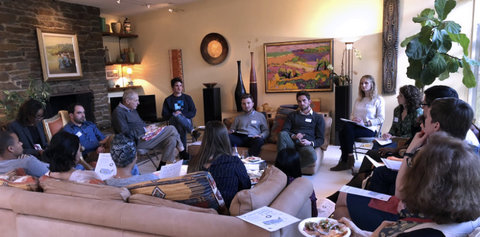Engage
Practitioners
Research-driven partnerships

The core of SPARQ’s work is research-driven collaborations with public and private sector partners. Projects typically take the form of multiyear, long-term research-practice partnerships in which we strive to produce actionable insights and high quality research. We establish our partnerships in a variety of ways. If you think there is potential for a research-driven partnership, feel free to reach out. Learn more about our approach and examples of our work.
Research clinics

SPARQ hosts research clinics at Stanford that convene practitioners and researchers in a 2-hour forum. At clinics, attendees workshop issues practitioners are facing in their work and brainstorm evidence-based strategies and solutions to address those issues. Check out past research clinics and partners.
Workshops and conference sessions

SPARQ also periodically convenes workshops or co-hosts conference sessions with practitioners to spend focused time delving deeply into issues and solutions. We partnered with the Oakland Police Department to host the White House Office of Science and Technology Policy for a roundtable on how to leverage police body-worn camera data. We also partnered with Illumen Capital and Impact Experience to co-host a convening of industry leaders about reducing bias in financial market decision making and a session at SOCAP (also with Prudential) on reducing bias in financial investing.
Researchers and Students
SPARQlab

SPARQlab provides undergraduate students with the opportunity to participate in SPARQ projects and put psychology to work in the world to make meaningful change. Research assistants learn how to design and run studies, code data, create surveys, write literature reviews, and more. They also participate in weekly discussions on current events, research methods, and career development. SPARQlab RAs gain valuable research experience and mentoring, and go on to graduate school as well as diverse career paths sparking change. Learn more about the lab and how to apply.
Postdoctoral Fellowship Program

SPARQ’s new postdoctoral fellowship program aims to promote the professional development of social psychologists who want to focus on addressing timely social problems and collaborate with practitioners on research-driven partnerships for change. Fellows have the opportunity to collaborate on ongoing projects with SPARQ and social psychology faculty at Stanford, develop new research, and grow their skills. They join a community of bridge builders between research and application who want to put social psychology to work in the world, bust the basic-applied binary, and learn from practitioners working to fight inequality and inspire cultural change in diverse domains.
Workshops and conference sessions

SPARQ periodically hosts sessions and workshops at national conferences. Recent events include a professional development session about building effective research-practitioner partnerships at the Society for Personality and Social Psychology Annual Convention; a session about leveraging data to improve police-community interactions and re-imagine policing at the Society for Experimental and Social Psychology Annual Conference; and a session on bias busting at the American Psychological Association Annual Convention.
Stanford University courses

SPARQ Faculty Co-Directors Jennifer Eberhardt and Hazel Rose Markus regularly teach courses at Stanford about using research in social psychology to tackle disparities and inspire culture change. Courses have included: Race and Crime (PSYCH 259), Race at Work (PSYCH 256), Social Psychological Perspectives on Stereotyping and Prejudice (PSYCH 180), Intergroup Communication (PSYCH 103), Introduction to Cultural Psychology (PSYCH 75), and Introduction to Comparative Studies in Race and Ethnicity (CSRE 196C/PSYCH 155).
Current Stanford students should check out: The Sociocultural Shaping of Psychological Experience (PSYCH 144), Mind, Culture, and Society (PSYCH 215), Racial Bias and Structural Inequality (OB 528), and Race and Natural Language Processing (LINGUIST 281A, PSYCH 257A).
SPARQ has also hosted its own course called SPARQshop (PSYC 180A/283A), a course for undergraduate and graduate students who want to learn how to turn social psychological research into digital tools. SPARQ has also offered a VPGE interdisciplinary graduate workshop on Research in the Real World.
Scaling Our Impact
We are developing projects and programs to scale our work and impact. We are seeking partners and funders to support these efforts.
Donate
SPARQ appreciates the support of individual donors, foundations, and other organizations to advance our mission. If you would like to make a donation, visit the Stanford University online donation portal. In the portal, under "Direct your gift," first select "School of Humanities and Sciences," and then "Other Stanford Designation" in the box below. Please write "Stanford SPARQ - Department of Psychology" under "Other" so that your gift is directed properly. For more information, contact us at Stanford_SPARQ@stanford.edu.
Jobs
Multiple Positions - Research Scientist
SPARQ is hiring research scientists to join our team beginning in the summer of 2024! These positions are a great fit for well-trained social scientists who want to put their skills to work in field-based settings and in direct collaboration with practitioners and communities. Apply by April 15 for first consideration. We welcome applicants at different experience levels, from recent Ph.D. graduates to those who have worked in academic, alt-academic, or public/private sector roles.
Research Assistants
Applications for spring quarter undergraduate research assistant positions have closed. Please check back in the fall quarter.